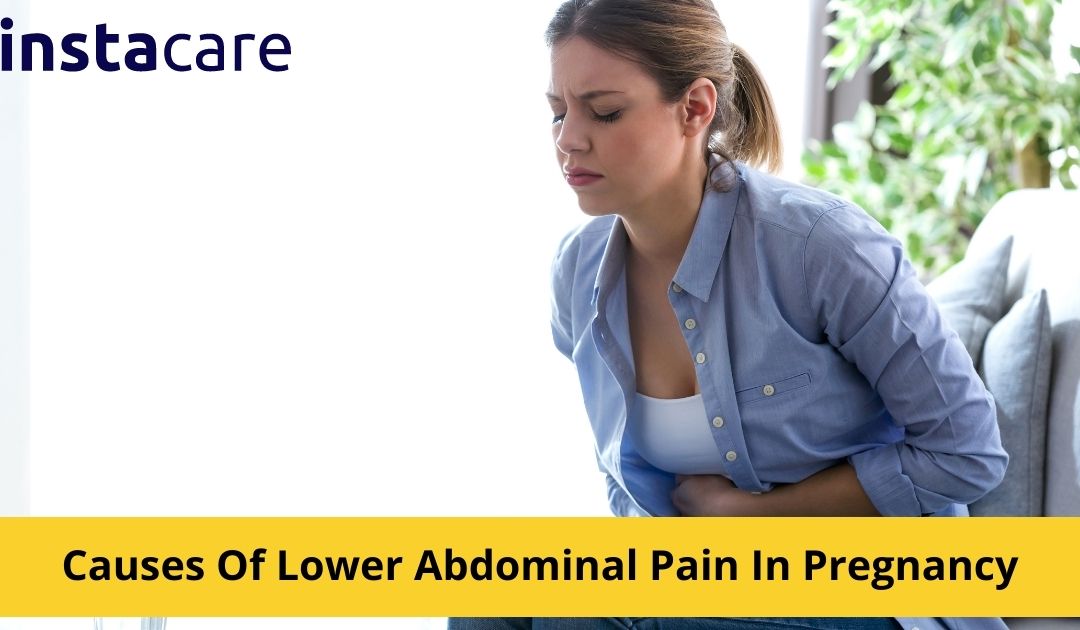Pregnancy is a beautiful period in your life, and your body is through many changes. Unexpected illness or discomfort that appears out of nowhere might be concerning.
Internal organs move, and ligaments and muscles adjust to support your increasing belly as your uterus develops out of your pelvis. This might result in some weird and unpleasant sensations. Here's a rundown of the most frequent and uncommon reasons for abdominal pain in early pregnancy and when you should seek medical advice.
Common Causes Of Abdominal Pain
You may experience discomfort while your body undergoes tremendous changes. Your other organs are pushed out of the way as your baby grows, and you bear greater weight in your abdomen. This can result in a variety of typical reasons of stomach discomfort during pregnancy, all of which are readily controlled and will most likely go away on their own:
Strained Muscles
Most women gain between 25 and 35 pounds to support their kids throughout pregnancy. The impact of your hormones on your muscles and ligaments, paired with your weight, can easily result in strained muscles in your back, sides, and abdomen. Muscle strain pain is usually sensitive and sore, and it persists in the place where the power was strained.
Problems With Digestion
Especially in the second and third trimesters, your baby exerts a lot of pressure on your stomach and intestines. Gas, bloating, and constipation are all possible causes of stomach pain. If your discomfort appears to be related to what you eat, make a point of drinking plenty of water and increasing your fiber intake.
Cramping
Just because you're not experiencing periods when pregnant doesn't mean you won't have cramping. Your uterus extends substantially, and you may have cramping while it adapts, especially in the first and second semesters. These cramps will feel like menstrual cramps, with agonizing or stabbing pain, but they will usually be alleviated by heat or go away on their own.
View More: What Should You Know About White Discharge In Early Pregnancy
Braxton Hicks Contractions
Braxton Hicks contractions, commonly known as "false labor" pains, are a type of rehearsal for genuine labor. They are usually milder than actual labor, irregular, and tend to start strong and go away. Braxton Hicks’s contractions might be uncomfortable or painful, but if you change positions or walk about, they will cease on their own.
Sharp Discomfort In The Side Or Groin For Less Than 2 Minutes
Abdominal pain in pregnancy in the sides is typical, especially in the first and third trimesters. It is often characterized as a stitch-like agony on the right or left side that can take your breath away. One probable reason is a spasm of the round ligament that holds the uterus in place. Your uterus grows, so these short, thick circular ligaments stretch to accommodate it. They can stretch too quickly, such as when you get out of bed or move uncomfortably and have a spasm.
Pressure Or Pulling In Your Lower Abdomen
It's natural to feel pressure or tugging in your lower abdomen as your pregnancy advances. The weight of your uterus, placenta, amniotic fluid, and growing baby all contribute to this unpleasant sensation. The hipbones that support this extra weight become uncomfortable and tired when your belly bulges over your pubic bone and gravity takes over.
How Might This Stress Be Reduced?
Standing for lengthy periods is not recommended. If your job requires you to bear weight for long periods, and abdominal brace or support underwear, which your health insurance may reimburse, may be beneficial. Exercises to strengthen your back and abdominal muscles should be done, as should postures that take your baby's weight off your lower abdomen. A lot of stomach pain can be relieved by strengthening the pelvic floor muscles.
Limit Your Movements
Do not do anything to aggravate the discomfort. Keep your knees close together and take tiny steps. When sitting, do not cross them. When getting in and out of bed, avoid making uncomfortable motions. Wear an abdominal support belt and limit your weight-bearing sessions. Consult a physiotherapist if this discomfort prevents you from walking normally.
View More: What Is a Blood Test for Pregnancy And How Does It Work
Exercise Can Help
Lifting your arms up and out to the sides is an excellent exercise. Make sure you have good posture and don't "slouch" over your uterus, which is already packed. To ease some of the strain and agony of hurting ribs, sit up as straight as possible and conduct focused belly breathing.
Look Out For
Any pain felt under the ribs, particularly on the right side, may be cause for concern, especially if you have high blood pressure. Always check with your caregiver if you are worried.
Conclusion
Lower abdominal pain in pregnancy may be normal but consult your caregiver if you experience a watery, pinkish discharge along with this pressure; it might indicate early labor.
Please book an appointment with the best Gynecologist in Lahore, Karachi, Islamabad, and all major cities of Pakistan through InstaCare, or call our helpline at 03100002273 to find the verified doctor for your disease.












